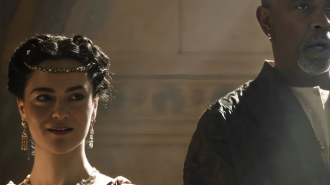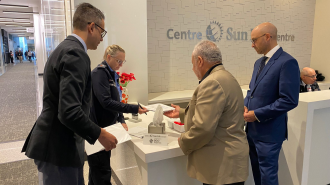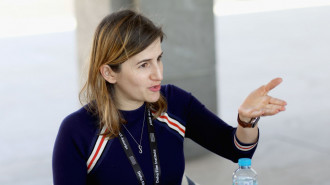
Plestia Alaqad: Heroic Gaza journalist in Beirut after receiving Shireen Abu Akleh scholarship

On her personal Instagram account are two posts side by side: the first is a selfie of her in an elegant blue top, with neatly combed hair, her smile filling the photo. The second is dated eight days later: a video where her voice shakes, fear visible in her eyes. Explosions are audible in the background.
It was this video that introduced 22-year-old Palestinian journalist Plestia Alaqad to the world — the recent journalism graduate using her Instagram page to cover the initial, horrific weeks of Israel's genocidal onslaught in Gaza.
Following that video, dated October 9, 2023, was a constant stream of videos, showing terrifying scenes of slaughter, bombed-out wreckage, and lifeless bodies.
On November 21, Plestia published a video explaining she had left Gaza with her family via the Rafah crossing, headed for Australia.
But today, she's in Lebanon, having just arrived to study for a Master's degree in Media Studies at the American University of Beirut (AUB), after receiving the Shireen Abu Akleh Memorial Scholarship, which AUB is offering in partnership with the Yafa Foundation.
Plestia says it's an honour to receive the scholarship, adding that Abu Akleh's presence is always "among us", her journalism inspiring the next generation.
"When times are tough, I remember Shireen's words: endurance is required; keep your spirits up. Our achievements may seem insignificant. However, as they accumulate, they propel our movement forward, one step at a time," Plestia wrote in the post announcing her arrival in Beirut.
The young reporter alludes in the post to the paradox of being in Beirut to pursue her university studies while "the occupation has destroyed every university in Gaza," but adds that Israel won't stop "young women like me from learning, as we strive together towards justice."
[Instagram @plestia.alaqad]
Beirut: 'I feel at home here'
On choosing to study in the Lebanese city when she could have gone somewhere safer, Plestia said to Al-Araby Al-Jadeed, The New Arab's Arabic-language sister edition: "Lebanon reminds me a lot of Gaza — the people both here and there have suffered a lot and I feel at home here.
"Though I hope the war won't expand, if it does, that won't be something new to me, and I'll be ready to convey the suffering of the people here."
Plestia, whose family name goes back generations in Gaza, never expected to cover massacres and genocidal crimes while only taking her first journalistic steps — having graduated two years earlier — despite having lived through successive wars growing up.
She is saddened by the media's coverage of Palestinians, which she believes has long dehumanised Palestinians by using certain terminology to encourage people to view them simply as numbers.
"My coverage pushed people to interact with Palestinian people, relate to them, and to comprehend more fully what we are suffering," she explains.
She says she wishes "the world had known me when I was filming beautiful stories about Gaza, before knowing me as I documented Israel's crimes and massacres against my people, but I'm proud I was able to impart — even if just slightly — our suffering in Gaza to the world."
For Plestia, after having covered Israel's war of extermination against her people, it's hard to fathom covering other news, at least right now.
She says what she witnessed in Gaza after October 7 has made her view other news receiving media coverage and ask herself "whether what I am seeing is really news," compared with what's happening there.
"Honestly, I cannot find words to express what I experienced, felt, and saw: words and photos are inadequate, to convey what is happening in Gaza."
Though she survived the genocide and is no longer in Gaza, harrowing images crowd her imagination, she says.
"Perhaps the most difficult are the scenes of displacement… seeing an old man carrying a bag of whatever he could find from his home, walking into the unknown."
Glaring media bias
Plestia's words confirm what many human rights and media reports have made clear: that from the start of Israel's assault, Western media has shown a glaring bias towards the Israeli narrative.
This is a recurring bias, repeated in every war that Israel has unleashed on the besieged Gaza Strip over the last two decades.
Perhaps it was this which prompted Plestia, alongside dozens of young Gazan photographers and journalists, to transform their social media pages into public spaces where Israel's barbarity – and the falseness of its narrative – were exposed.
Since October 7, the names of several young journalists have become famous, transformed by the war into field reporters and content creators.
They provided Arab and international media organisations with direct footage showing the unmasked reality and transmitted the testimonies of displaced Gazans, and their daily efforts to flee the hell of Israeli missiles.
These journalists include Bisan Owda, Motaz Azaiza, and Hind Khoudary, among others, whose content has formed a threat to Israel's narrative.
A sign this wasn't going unnoticed came when 150 Hollywood celebrities signed a letter demanding the Emmy Awards cancel Bisan Owda's nomination for the News and Documentary Emmy Awards, due to her alleged ties to the Popular Front for the Liberation of Palestine (PFLP). Their request was rejected.
"Since the first moments the Israeli war erupted on the Gaza Strip, I knew what was coming would be unlike any previous Israeli war on the Strip," explains Plestia.
As a journalist, she felt she had no choice but to transmit what was happening in Gaza to the world, despite her limited experience in journalism.
"Otherwise we would have been waiting for foreign journalists to enter Gaza and report the Palestinian story in their Western style," she explains.
This, of course, never happened as Israel quickly began banning entry of foreign journalists into Gaza, unless they were accompanied by Israeli military personnel.
Though dozens of international organisations have repeatedly demanded Israel allow reporters into Gaza, the crossings remain closed.
This reality has impressed the need upon all journalists, bloggers, and activists in Gaza to provide the world with visual content showing the brutality of Israel's massacres, especially in light of the world's willful blindness for months regarding this genocide.
"To be a journalist in Gaza means to report the news when you could end up becoming the news at any moment," states Plestia, who hopes to return to Gaza to cover the rebuilding of "everything that has been destroyed."
At least 172 Gazan journalists have now been killed since October 7, according to Gaza's government media office.
This is an edited translation from our Arabic edition. To read the original article click here
Translated by Rose Chacko
This article is taken from our Arabic sister publication, Al-Araby Al Jadeed and mirrors the source's original editorial guidelines and reporting policies. Any requests for correction or comment will be forwarded to the original authors and editors
Have questions or comments? Email us at: info@alaraby.co.uk








 Follow the Middle East's top stories in English at The New Arab on Google News
Follow the Middle East's top stories in English at The New Arab on Google News


